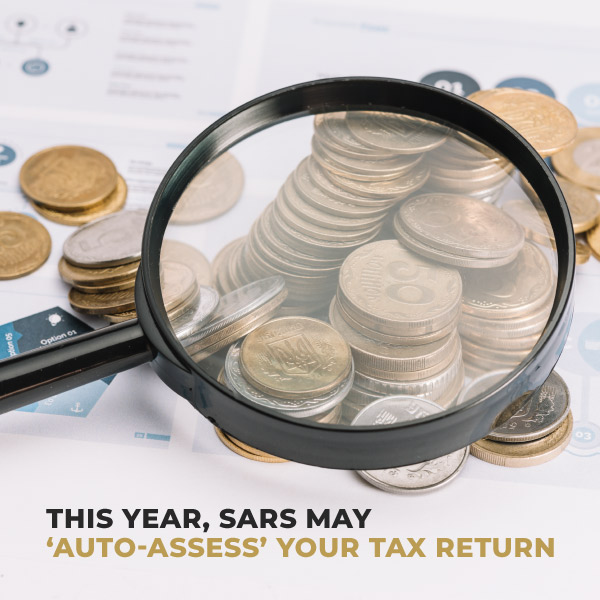THIS YEAR, SARS MAY ‘AUTO-ASSESS’ YOUR TAX RETURN: HERE’S WHAT YOU NEED TO KNOW
This year, the SA Revenue Service says it will assess “a significant number” of taxpayers automatically. This means that it will complete your return with all the information it received for you – gathered from your employer, bank, medical scheme, retirement annuity administrator and other companies – and send you an assessment. If you accept it, you won’t have to file a tax return at all.
The auto assessments started last year, but this year a much larger group of taxpayers will receive already completed returns.
How do you know if you will be auto-assessed?
SARS will send you an SMS by end-August to alert you that your completed return is available in eFiling or on the SARS mobile app. If you accept the assessment and a refund is due, it will be paid into to your bank account.
What happens if you don’t accept the auto-assessment?
If you dispute the assessment, you can file your edited tax return electronically by 16 November.
What should you look out for?
Each taxpayer needs to validate their auto-prepared tax return with the information they received from third parties, before accepting the assessment, says Thamsanqa Msiza, head of individual tax returns at Tax Consulting SA.
Check your IRP5/IT3(a)s and other tax certificates like your medical certificate, retirement annuity fund certificate and other third-party data against the information provided in the return. If you don’t have the certificates yet, contact your employer, medical scheme, retirement annuity fund and other third parties to get it.
“Only once a taxpayer has compared the tax documents he or she received from his or her employer, medical aid scheme, banking institutions and other parties in respect of the 2020 tax year to the SARS issued auto-assessment and agreed the figures, can one accept the auto-assessment,” says Doné Howell, director of BDO Tax Services.
Taxpayers who have more complex returns – i.e. travel allowance claims – will need to carefully review their auto-assessments, Msiza says.
Are there any dangers to being auto-assessed?
One concern is that SARS will issue auto-assessments based only on the data which third parties are obliged to submit to SARS, and to the extent that such data meets its verification process, says Howell.
This means that additional income or deductions may not be included. For example, if you made a donation to a qualifying organisation, you may be able to claim a tax deduction. Or if you started to trade and now earn business income, this may also not be reflected in the tax return.
You may also have had home office expenses that can be deducted, or claims that your medical aid did not pay, which may not be reflected on your return.
If you accept the auto-completed tax return without adding these deductions, you may miss out on tax relief. Alternatively, you could face tax penalties if SARS later confirms that you earned income that wasn’t declared.
TAX SEASON 2020 DEADLINES
| TYPE OF TAXPAYER | CHANNEL | DUE DATE |
|---|---|---|
| Non-Provisional and provisional taxpayers | Manually at a SARS Branch | 22 October 2020 |
| Non-provisional taxpayers | File electronically | 16 November 2020 |
| Provisional taxpayers | File electronically | 31 January 2021 |
![2025-logo-[Recovered] Tax Consulting South Africa](https://www.taxconsulting.co.za/wp-content/uploads/2025/01/2025-logo-Recovered.png)




